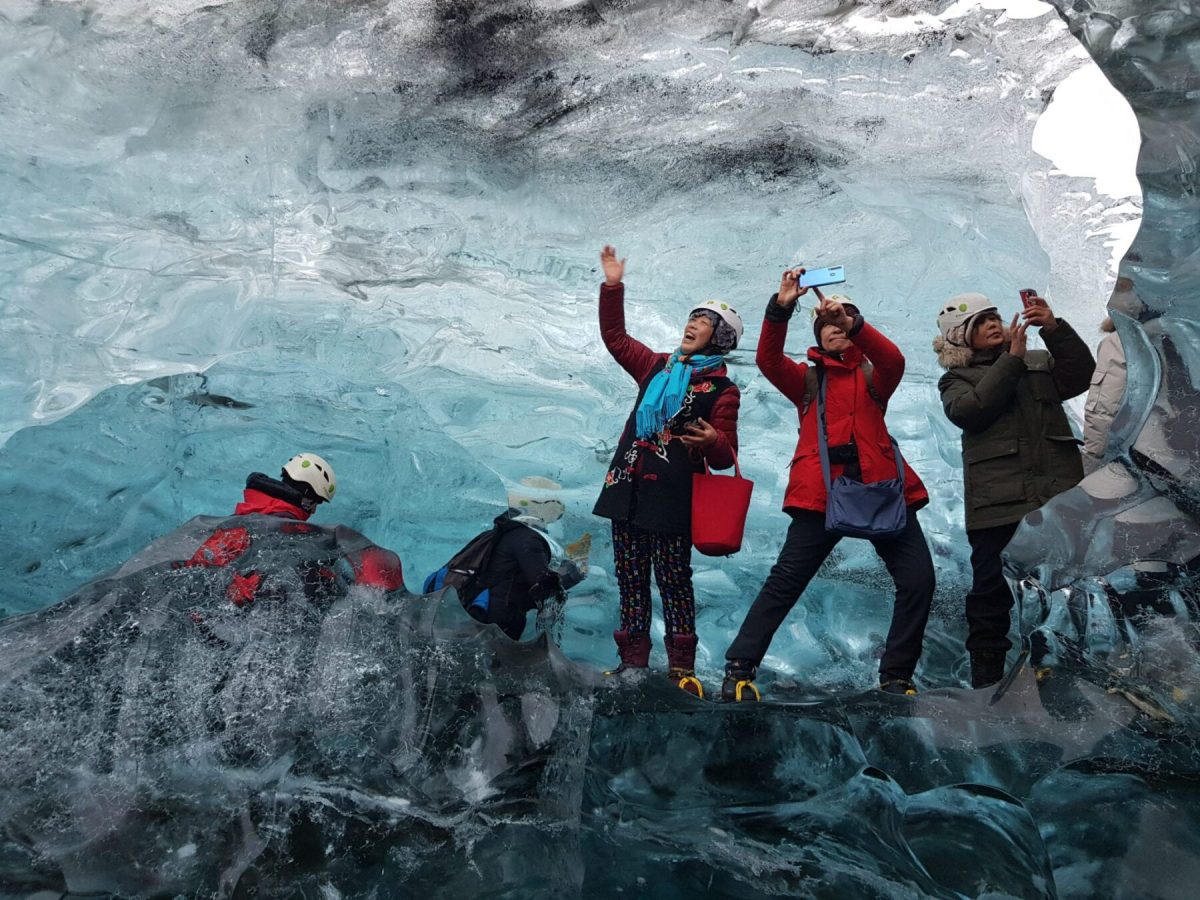The Best Travel Writing of the Year: Our Favorite Stories of 2022

Skift Take
Every year we give you a glimpse into how our favorite stories evolved from idea to publication, offered by the reporters and editors themselves.
As you will see, our work was far-ranging in 2022 and not obsessively focused on pandemic fallout as it had been in prior years. I am always incredibly grateful to work with this team day in and day out. Showcasing some its best work, once again, is a highlight of the year.
Please take a look, and we hope you find that our favorites are yours, too.
Dennis Schaal, Founding Editor
Puerto Rico Offers These Lessons for Global Tourism
The Backstory: My Skift Take for this story summed it up. "Puerto Rico tourism, bolstered by Airbnb when hotels were shut, has had a noteworthy comeback. But if travel and living have blended, then the island's fiscal and political woes can't be overlooked."
This was my favorite story of the year to write — and it was a very important one, too — because it wasn't just about "travel," but dealt with the impact of Airbnb, tourism, U.S. colonialism, and unfettered development on the island's people.
No, this wasn't a rah-rah, boosterish tourism story that you might see in trade publications (and I've never considered a Skift a trade publication, per se). I interviewed people inside and outside the travel industry, including my local bartender in Rincón, Puerto Rico, and a customer at the bar who turned out to be an expert in land usage and its environmental impact.
Yes, it hit close to home since I live in Rincón, and several times people driving by my apartment on a fairly busy, small roadway have stopped their cars, honked their horns to get my attention, and asked me whether the home has apartments to rent. With an an acute housing shortage in Puerto Rico and soaring rental prices, I sadly informed them that no, the other apartments in the home are Airbnbs. (No, I'm not the host.)
The story has lots of real reporting, which I love doing, and holds tourism and other officials to account. That's our job as journalists, after all.
Jay Shabat, Senior Analyst, Airline Weekly
The Backstory: Each quarter, I review all available airline financial statements, paying particular attention to operating margins. I was naturally impressed at how well Turkish Airlines performed this summer. Not only did the company earn an extraordinary profit. It did so while growing aggressively. How did Turkish manage to pull this off?
My investigation led me to interesting and unexpected discoveries, like how Istanbul was benefitting from operational difficulties at other European airports, and from a jump in traffic from Russia. The story was no less interesting on the cost side, with Turkish Airlines managing to avoid some of the cost problems afflicting other carriers in 2022. With each passing year, Turkish is becoming more and more important to the global aviation landscape, flying to more and more places with more and more planes. The pandemic, it seemed, was but a brief and mild disruption to its meteoric rise.
Can it keep things going? Its ambitions certainly haven’t cooled, as my article made clear. I’ll most certainly be watching Turkish Airlines closely in 2023.
Rashaad Jorden, Associate Editor
A Daughter of Nigerian Immigrants Helping Under-Represented Students See the World
The Backstory: I was tasked with doing At Your Service, Skift’s monthly feature of an individual with a cool job in travel, for April. The person who I was first assigned to profile for the article didn’t have any time for an interview. But then I was referred to Bola Ibidapo, the co-founder of the Too Fly Foundation, which works to provide study abroad opportunities for students in under-represented groups, most notably Hispanic and African Americans.
I was excited about the opportunity to interview Ibidapo because I was eager to hear about how she was working to create study-abroad opportunities for young people. It was apparent early on during our interview that this would be a great story because she was passionate about her work. And I loved seeing Ibidapo light up about how she and Too Fly co-founder Brandon Miller were working to make study abroad sound exciting, including turning information sessions about opportunities into pep rallies.
There are so many people doing amazing things in the travel industry, and I was honored to feature one of them.
Sean O'Neill, Senior Hospitality Editor
BET Co-Founder Expands Hotel Brand Salamander in Pursuit of the New Luxury
The Backstory: This was a transition year for me as I moved from covering the travel tech beat (where I had a notable scoop on Sabre trying to sell its hotel software division, if I do say so myself). It's been intimidating, frankly, to delve into the complexities of the hotel industry. I call out this piece as my favorite because Skift hadn't had previously profiled Sheila Johnson, the founder of the hotel brand Salamander Hotels & Resorts. So I was pleased when Johnson accepted the invite to chat. Her story is one of obstacles overcome, my favorite type of profile to write. Her brand has a real shot at making its new DC property the scene-setting hotel in the national's capital.
Justin Dawes, Travel Tech Reporter
The Case for Virtual Experiences Thriving Even as In-Person Travel Returns
The Backstory: I’m always impressed by entrepreneurs who see an opportunity and go for it.
The three entrepreneurs highlighted in this article — one of my first as the new tech reporter for Skift — each saw an opportunity during the pandemic to help people travel virtually while they were stuck inside.
Demand for virtual travel has faded in a lot of ways with the pandemic's end, but their work uncovered a need that had gone overlooked until then. Their virtual travel businesses are still growing now, particularly in partnership with nursing homes for resident actives, schools for enhanced lessons, and workplaces as an employee benefit.
The school partnerships resonates with me in particular because I come from a family in the Midwest that never traveled — and I mean never. I’ve done plenty of solo traveling over the years, but we didn’t leave my home state for a family trip until I was in my 20s, and that was only for a cousin’s wedding and then straight back home. I love travel now, of course, but I think if I had had some kind of virtual experience as a child, the travel bug would have bitten me a lot sooner.
Andrea Doyle, Senior Editor, Skift Meetings
Events May Turn Away From States Where Abortion Is Now Illegal
The Backstory: The U.S. Supreme Court’s seismic decision to strike down Roe v. Wade sent shock waves through the events industry. As a result, many planners vowed not to have gatherings in states with anti-abortion policies.
The issue of abortion is contentious and sharply divides America. The Pew Research Center reports that 61 percent of U.S. adults say abortion should be legal in all or most cases, while 37 percent think abortion should be illegalin all or most cases.
The fact this decision took away a woman’s fundamental right infuriates me, but I had to stay objective in my reporting. I also had to keep my story focused on its impact on meetings and conventions.
I spoke to many meeting professionals, although only a few were willing to go on the record. One of them was Jack Molisani, executive director and owner of LavaCon; a conference focused on content strategists. He pulled his 2023 gathering from Austin as Texas has a trigger law that banned abortions once the Roe v. Wade ruling happened. Molisani pulled out of Texas even though there will be financial ramifications. “It is principle,” he said, adding that he never
thought he would be in a position to have to take a stand on abortion, but he saw no choice.
Industry insiders counter, saying boycotts are not the way to deal with this issue. Bringing a group in and meeting with local lawmakers is the way to make effective change.
This story is far from over, and I plan to continue covering it in 2023.
Dawit Habtemariam, Global Tourism Reporter
TikTok's Short-Form Video Revolution Gains Traction in Search for Destination
The Backstory: The evolution of media is one of my favorite topics. Topics like on-demand streaming eating away at traditional TV's dominance fascinate me and the rise and fall of radio broadcasting fascinate me. So it was also privilege to contribute to the conversation with this article on short-form videos changing how we find travel content.
But the article also caused me to flex my imagination of the future. It was a blast to interview insightful travel marketing executives, comb through TikTok videos and consider the creative possibilities destinations now have to stand out online.
I honestly didn't know how much of an influence TikTok had on the media landscape until now. Thought it was just used by Zoomers. YouTube, Instagram and Google are basically trying to replicate TikTok's success with short-form vertical videos. We really are in the midst of a media shift. Short-form videos are here to stay, and they may even become the primary source of information consumption in our lifetime. Matador Network CEO Ross Borden told me in an interview for the article that he expects short-form vertical video to be the most important format in the next five to ten years across all industries. That gave me the chills and made me think of The Buggle's song "Video Killed the Radio Star."
After working on this article, let's just say I've started to take my own TikTok account seriously.
Peden Doma Bhutia, Asia Editor
Taj Mahal: A Wonder of the World in Peril
The Backstory: Being an India-based journalist in the travel space and writing a story on the Taj Mahal may sound like a cliche. But for precisely the same reason, the Taj isn't just a monument to me. The deep dive on Taj Mahal was my attempt to highlight how this symbol of history and excellence in art and architecture could be drawn into the country's divisive politics, and how that could take the sheen off its lustrous marble even more than the pollution it weathers every day.
The story was also challenging because an icon like the Taj comes with its own shroud of myth and misinformation, which I had to cut through. And of course, the trivia that I gathered while talking to people for the story made me appreciate the architectural marvel a little more.
Matthew Parsons, Corporate Travel Editor
Mastering the New Hidden Travel Networks
The Backstory: We tend to explore future trends at Skift, so it’s occasionally enjoyable to take a look back. I really enjoyed covering our Future of Lodging Forum in May this year, because of an almost throwaway remark from one of the speakers, Sam Khazary, senior vice president of global corporate development at Selina.
He made what I thought was a thought-provoking comment as he discussed routes being taken by digital nomads: “A lot of people in Israel spend a lot of time on the west coast of Panama. I have no idea why, it’s been like that the past 35 years.”
A remark like this sets off the imagination, and I’m convinced the conversation emerged as it was a real-life interaction, rather than a video interview, with great on-stage moderating from Seth Borko, Skift's senior research analyst.
The result? My mind thought of the spice route that flowed through Asia, Africa, and Europe for hundreds of years.
And so writing this piece was a timely reminder that some things are just ingrained in history. Sure there's probably billions of dollars invested in marketing technology, digital influencers and more. But we mustn't ignore the fact that these sorts of pathways are going to be critical to the travel industry. We still have people fleeing the war in Ukraine, we have energy refugees, we have people escaping political turmoil, and unfortunately coming soon, climate migrants — those who are forced to leave their countries because of extreme weather.
The travel industry will always collide in some way with these new collectives and groupings, and has a chance to do so in a positive way. Writing this story brought that home to me.
Edward Russell, Editor, Airline Weekly
How Latin America Is the Future of the Airline Industry
The Backstory: Since the pandemic began, it was clear to me that the crisis was a watershed moment for airlines. The industry needed to change and, where government’s didn’t step in with aid, that change was likely to come through bankruptcies and consolidation. Hence I began following Avianca, Latam Airlines, and Aeromexico closely after they filed for Chapter 11 bankruptcy in quick succession in 2020.
Fast forward two years, and those bankruptcies have wrapped up but the Latin American industry is very much in the throes of consolidation. To go deep into what was happening, I traveled to the region's preeminent regional industry event, the ALTA Leaders Forum, in Buenos Aires to speak to the CEOs of Latin American airlines. I’d described the sentiment as guardedly optimistic: Most spoke of surging travel demand but with high inflation and fuel prices making the need for consolidation, or other commercial partnerships, ever more important.
Viva Air CEO Felix Antelo, whose airline is struggling despite having opened air travel to the masses in Colombia, summed the situation up frankly: “Staying independent in aviation in the 2020s is not an option. It was hard pre-pandemic. It’s not an option now.” Indeed, without government aid — or with governments wishing to shed their obligations — many other airlines around the world now face a similar need to consolidate, from ITA Airways and TAP Air Portugal in Europe to SriLankan Airlines in Asia. Writing about how Latin America got there first was my reporting highlight of the year.
Miguel Neves, Editor-in-Chief, Skift Meetings
Meet Your Best Event Planning Resource: AI
The Backstory: Over the last five years, multiple event tech companies have used artificial intelligence (AI) in their platforms. However, while the claims are impressive, it was always hard to test the quality and the value of these uses of AI.
Cut to November 30, 2022, and ChatGPT was released and open to the public during a research review stage. Less than a week later, it had crossed the one million user mark, the fastest technology to ever do so.
News about the platform and its exciting uses appeared everywhere on social media, so I started testing it. Initially, I asked it several interesting general knowledge questions. Then, impressed with the answers, I tried to see if I could use it for planning meetings. Well, it turned out I could, so I started collating everything I asked it to do, all around the concept of planning a new conference about AI in the meetings industry.
ChatGPT created helpful resources around the conference concept, finding appropriate venues, marketing materials (including website copy and emails), sourcing speakers and sponsors, survey questions, and even shot lists for photographers and videographers.
In total, I shared 26 different outputs that, while not of award-winning quality, can be incredibly useful as solid bases for planning any meeting.
This technological evolution is exciting for geeks like me and a little scary. But, It will be game-changing for so many people. It is one of those moments that does change everything, and I'm glad I was able to document it.





